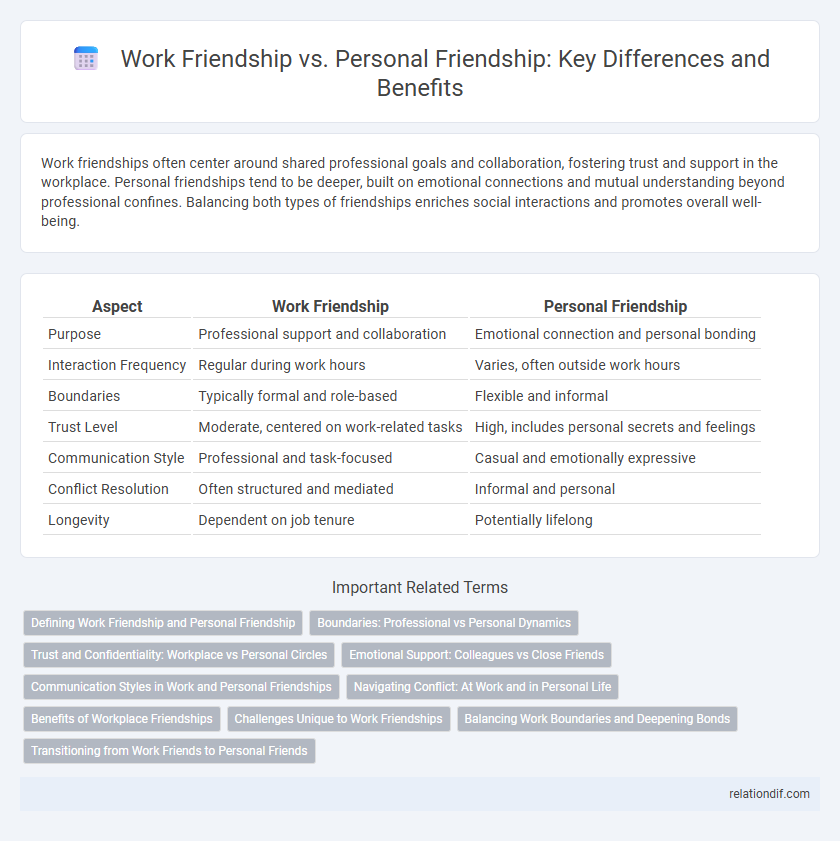Work friendships often center around shared professional goals and collaboration, fostering trust and support in the workplace. Personal friendships tend to be deeper, built on emotional connections and mutual understanding beyond professional confines. Balancing both types of friendships enriches social interactions and promotes overall well-being.
Table of Comparison
| Aspect | Work Friendship | Personal Friendship |
|---|---|---|
| Purpose | Professional support and collaboration | Emotional connection and personal bonding |
| Interaction Frequency | Regular during work hours | Varies, often outside work hours |
| Boundaries | Typically formal and role-based | Flexible and informal |
| Trust Level | Moderate, centered on work-related tasks | High, includes personal secrets and feelings |
| Communication Style | Professional and task-focused | Casual and emotionally expressive |
| Conflict Resolution | Often structured and mediated | Informal and personal |
| Longevity | Dependent on job tenure | Potentially lifelong |
Defining Work Friendship and Personal Friendship
Work friendship centers on professional interactions, mutual support in job-related tasks, and shared goals within the workplace environment. Personal friendship involves deeper emotional bonds, trust, and activities beyond work, emphasizing vulnerability and personal life sharing. Understanding these distinctions helps navigate social dynamics and maintain appropriate boundaries in both settings.
Boundaries: Professional vs Personal Dynamics
Work friendships require clear boundaries to maintain professionalism and ensure productivity, often limiting emotional sharing and personal topics. In contrast, personal friendships thrive on deeper emotional connections, trust, and open communication without rigid constraints. Understanding and respecting these boundary differences helps prevent conflicts and fosters healthy relationships in both contexts.
Trust and Confidentiality: Workplace vs Personal Circles
Work friendships often require balancing professionalism with trust, as confidentiality is crucial for maintaining workplace harmony and respecting company policies. Personal friendships typically allow for deeper emotional sharing and vulnerability, fostering a higher level of trust beyond the constraints of professional boundaries. The dynamic of confidentiality shifts significantly: workplace trust protects career interests, while personal trust nurtures emotional security and support.
Emotional Support: Colleagues vs Close Friends
Emotional support in work friendships often centers on professional challenges and problem-solving, providing practical encouragement within the office environment. Personal friendships deliver deeper emotional connections, offering comfort, understanding, and validation beyond job-related issues. Close friends typically share vulnerabilities and celebrate life milestones, fostering a sense of belonging and trust that work friendships may lack.
Communication Styles in Work and Personal Friendships
Work friendships often rely on clear, concise communication focused on tasks and professional goals, while personal friendships embrace more expressive, emotional, and informal exchanges. In professional settings, communication tends to be goal-oriented and structured to maintain productivity and boundaries. Personal friendships, by contrast, encourage vulnerability and spontaneity, fostering deeper emotional connections through open and empathetic dialogues.
Navigating Conflict: At Work and in Personal Life
Navigating conflict in work friendships requires professional communication, setting clear boundaries, and focusing on solutions to maintain team cohesion and productivity. In personal friendships, conflict resolution often involves emotional openness, empathy, and mutual support to strengthen the bond. Understanding these different dynamics helps preserve trust and respect in both environments.
Benefits of Workplace Friendships
Workplace friendships enhance job satisfaction by fostering trust, collaboration, and effective communication among colleagues, which boosts productivity and reduces stress. These relationships provide emotional support and a sense of belonging, contributing to improved mental health and resilience in high-pressure environments. Moreover, strong work friendships facilitate career development through mentorship, knowledge sharing, and increased engagement in organizational goals.
Challenges Unique to Work Friendships
Work friendships often face challenges such as navigating professional boundaries and maintaining confidentiality, which can complicate genuine connection. Balancing team dynamics with personal emotions requires careful consideration to avoid conflicts of interest or perceptions of favoritism. Unlike personal friendships, work relationships must adapt to organizational hierarchies and performance expectations, creating unique stressors.
Balancing Work Boundaries and Deepening Bonds
Navigating the delicate balance between work friendship and personal friendship requires maintaining professional boundaries while cultivating genuine connections. Setting clear limits on sharing personal information at work helps protect privacy and prevents conflicts, yet investing time in meaningful dialogue fosters trust and emotional support. Prioritizing respect and empathy deepens bonds beyond the workspace, creating friendships grounded in authenticity and mutual understanding.
Transitioning from Work Friends to Personal Friends
Transitioning from work friends to personal friends involves building trust beyond professional boundaries and sharing experiences outside the office environment. Establishing common interests and investing time in social activities strengthens the emotional connection, fostering a deeper friendship. Maintaining clear communication and respecting each other's personal lives helps balance both work and personal relationships effectively.
work friendship vs personal friendship Infographic

 relationdif.com
relationdif.com